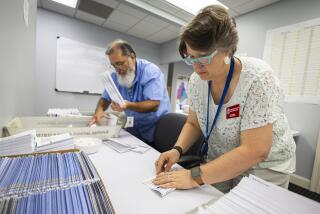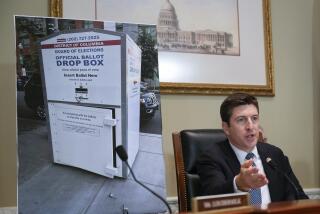Iraq Election Is Difficult in U.S. as Well
WASHINGTON — An ambitious effort to enable tens of thousands of Iraqi immigrants in the U.S. to take part in their nation’s first competitive election in half a century is encountering logistical challenges that some Iraqi and American officials fear could undermine the expatriates’ confidence in the historic vote.
Iraqis who fled the country during Saddam Hussein’s regime have dreamed for years of some day helping pick a replacement government. They have lobbied U.S. and Iraqi authorities for months to permit voting in the United States and 13 other countries with large expatriate communities.
But with the Jan. 30 election approaching, international election workers and U.S. and Iraqi officials are still scrambling to figure out how and where they can hold safe and fraud-free voting, who will be eligible, and how voters will reach polling sites that may be hundreds of miles away. In fact, voters will need to make the journey twice -- once to register, with a face-to-face interview, and a second time to cast their ballots.
Officials in the United Nations and the United States have long opposed out-of-country voting, fearing that it could overwhelm the Iraqi government’s limited capacities, and could lead to accusations of fraud by losing candidates.
But the Iraqi electoral commission’s decision last month to hold out-of-country voting reflected the feelings of former exiles who are on the commission and in the interim Iraqi government.
Even if the logistics are sorted out, some Iraqi and U.S. officials say, the complications could undermine the perceived legitimacy of an election that they hope will mark a turning point. Establishing the election’s legitimacy is the foremost goal, “and that means that Iraqis’ perceptions are very important,” said an Iraqi official who asked to remain unidentified.
Basam al-Hussaini, 41, an engineer in San Dimas who lost two brothers under Hussein’s regime, said he and other Iraqis in the U.S. were “very, very excited to have this chance to make things better in our beloved land.”
But Al-Hussaini, who lobbied hard for expatriates’ participation, said he was worried that the eligibility rules would exclude too many people, and that with a limited number of polling sites in the United States, many Iraqi Americans would find it too expensive and difficult to cast ballots.
“There are so many questions that are unanswered, and we’re talking about an election that is only [weeks] away,” Al-Hussaini said.
International election workers, who were not directed to begin work until last month, acknowledge that the task is daunting.
They say that the limited time severely restricts the kind of access they can provide for the Iraqi expatriate population, estimated at up to 300,000 in the United States and 4 million or more worldwide.
“Everybody’s aware there will be some serious shortcomings in the program,” said Peter Erben, director of the Iraqi out-of-country voting for the International Organization for Migration, a nongovernmental group chosen by Iraq’s electoral commission to organize the effort.
“There are inherent imperfections when you’re trying to do a program in such a short time.”
Erben, who is based in the Jordanian capital, Amman, said in a phone interview that time constraints and security concerns meant the organization would be able to set up only a small number of polling sites in the United States.
Although negotiations with U.S. officials on the arrangements are not quite complete, Erben said he believed there would be polling sites in several cities in addition to a central site in Washington.
And there would be satellite offices in each of the other cities chosen, Erben said, to improve access for voters.
Erben declined to speculate which cities would be chosen, but some U.S. Iraqis who have been involved in election discussions said they believed that, at a minimum, there would be a voting site in Detroit and another in Southern California, home to large concentrations of Iraqi emigres. There are also sizable communities in northern Virginia, Chicago, and Nashville.
But even if the number of cities with polling places grows substantially, some voters inevitably will need to travel hundreds of miles.
“We will not be able to give the coverage we would like to,” acknowledged Erben, whose organization is planning to expand its U.S. staff from five to about two dozen.
Iraqi expatriates in other parts of the world also will have to travel long distances, possibly to neighboring countries.
In addition to the United States, arrangements for expatriate voting are being made in Australia, Britain, Canada, Denmark, France, Germany, Iran, Jordan, Netherlands, Sweden, Syria, Turkey and the United Arab Emirates.
Some Iraqis in the U.S. have pushed to have balloting conducted through the mail or the Internet.
But Erben said those options had been ruled out because of the limited time and the risk of fraud.
The U.N. recommends against the use of mail balloting for out-of-country voting.
A U.N. official noted that Mexico uses mail-in voting, but only after it spent many years working to make the process fraud-proof.
A decision on eligibility of expatriate voters is expected soon from the Iraqi Election Commission. And though the commission is likely to be lenient in its rules, some expatriates may be disappointed.
The commission will permit voting for expatriates who are older than 18 and citizens of other countries, if they can provide adequate documentation. But it is not clear whether the commission will allow voting by foreign-born children of expatriates, as many Iraqi emigres are demanding.
Some U.S. Iraqis have also voiced unhappiness because election officials have said that they will be able to count up to 1 million out-of-country votes from the 14 nations where balloting will be conducted.
One U.S. organization, the Iraqi American Public Affairs Council, last week sent Internet messages to other U.S. expatriate groups saying that such a limit, combined with the requirement for in-person voting, meant that the vote would be “worthless.”
The group called for Iraqis in the U.S. to protest, saying they must “act now to protect your right to vote.”
Erben said the 1 million figure represented their best estimate of how many expatriates would vote. He said his organization, which also handled out-of-country voting in the Afghan presidential election in October, would take steps to increase its capacity if more expatriate voters turned out for the Iraq election. But, he said, the total could also be far less than 1 million.
Iraqi officials have acknowledged that organizing voting abroad will be difficult.
Feisal Istrabadi, an Iraqi American lawyer who is deputy Iraqi ambassador to the United Nations, said: “It is one thing to say in principle that they can vote. It is quite another to figure out the mechanism.”
Some Iraqis have expressed anxiety about the tens of thousands of ballots that are expected to be sent from Iran, where many Iraqi Shiites fled during Hussein’s regime. Some experts believe that the largest number of out-of-country votes will come from Iran.
There also is some concern that there could be attempts to tamper with the vote in Jordan, where many of Hussein’s predominately Sunni supporters fled when the regime fell.
Under the rules, officials of the 14 host countries won’t handle the ballots, but they will provide security and other help in some cases.
Another difficulty arises from the uncertainty about how many Iraqi expatriates there are, and where they live.
Erben said his group has heard estimates that 200,000 to 300,000 Iraqis live in the U.S. He said the uncertain figures made it more difficult to plan.
Indeed, some groups in the U.S. have far different estimates. Joseph T. Kassab, president of the Michigan-based Chaldean National Congress, estimates there are 1 million Iraqis in the United States, and 7 million worldwide.
Kassab also says that 85% of Iraqis in the United States are Christian, a figure disputed by other groups.
The uncertainties about the expatriate population are accompanied by widely differing predictions about which political factions will benefit from the voting.
Many Iraqi officials predict that the Shiite candidates will get the most boost from expatriate voting, followed by Kurdish and secular contenders. Sunni candidates are expected to benefit the least.
More to Read
Sign up for Essential California
The most important California stories and recommendations in your inbox every morning.
You may occasionally receive promotional content from the Los Angeles Times.











